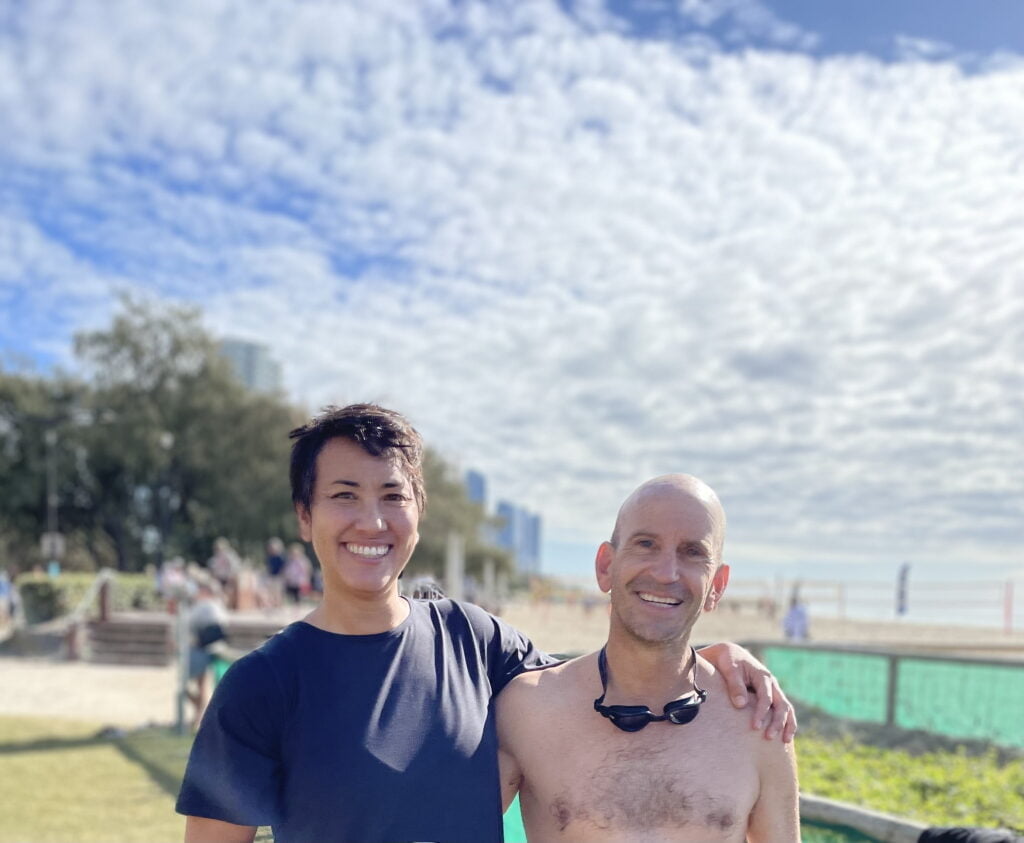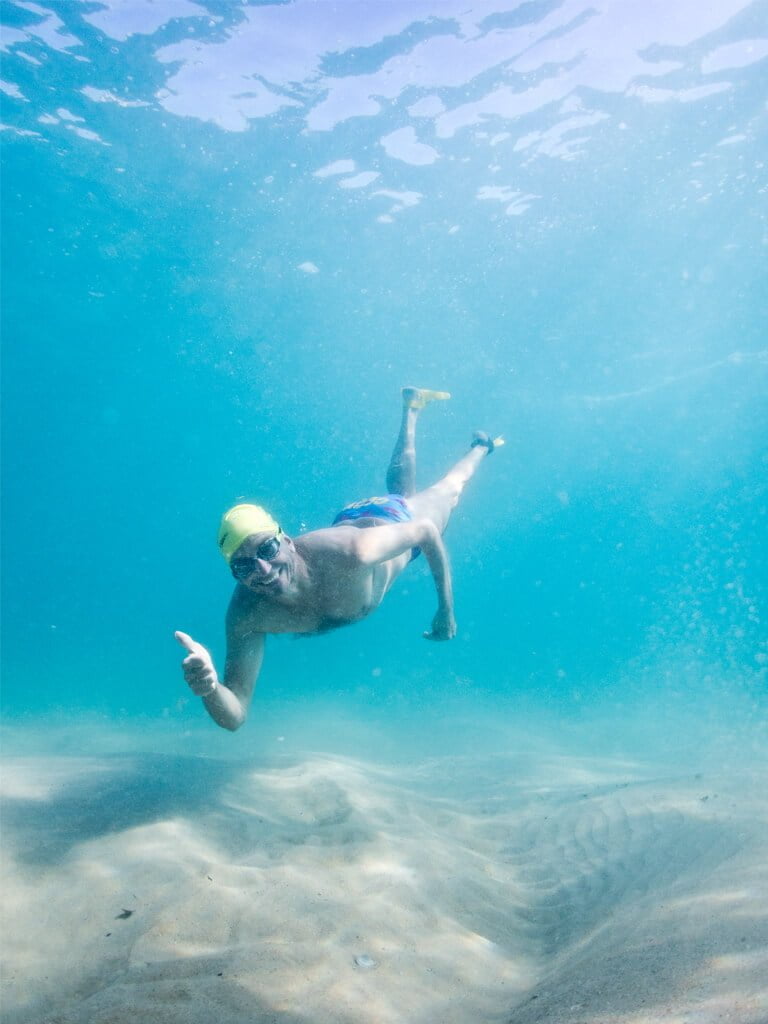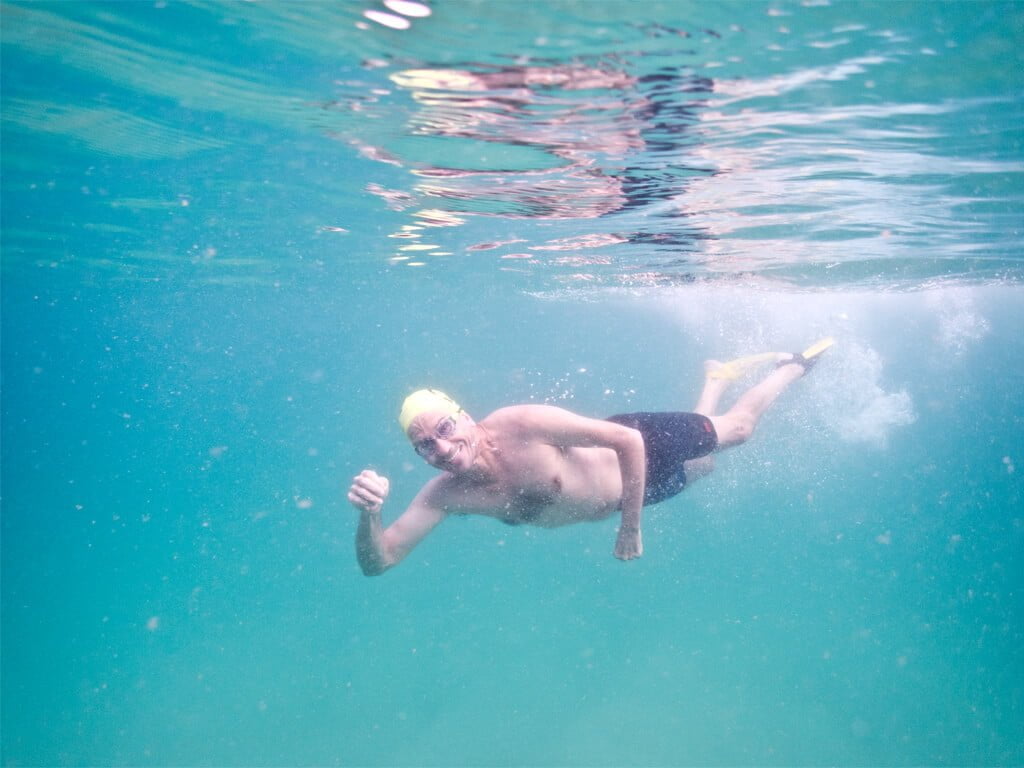No results available
ResetGold Coast-based ocean swimmer Rosie Ning chats with fellow swimmer Damien Bridger about ocean swimming with an acquired brain injury.
Gold Coast-based ocean swimmer Rosie Ning first met Damien Bridger as a large looming wave was about to crash over them during a regular Saturday morning swim with the Gold Coast Open Water Swimming Club.
The only way to avoid being caught in the white-water washing machine was to take a big breath & swim down and under the whole wave.
It was the first of three big waves with only short breaks between them. And by short, there was enough time to gasp one breath before the next wave arrived. It was tough getting out through the waves that day, and some of the ocean swimmers turned back, but not Damien.
When the 2-kilometre ocean swim was finished and their feet were on the sand, Rosie got to talking with Damien to explore his journey from acquired brain injury to conquering the open surf and sea.
Words and photos by Rosie.

What is an acquired brain injury?
Acquired brain injury (ABI) refers to any type of brain damage that occurs after birth. It can include damage sustained by infection, disease, lack of oxygen or a blow to the head. Two-thirds of all people with an ABI who have their activity limited or restricted are over the age of 45. One-third of those are over the age of 65. The largest age group is between 40 and 49 and, at all ages except for those aged 80 and over, rates for males are higher than for females. [Source: Better Health Vic]
Damien: My motivation to swim in the ocean, originates from my Dad. My motivation to swim in the ocean now is because it feels exhilarating to be in the ocean with a group of like-minded people. Battling the waves, the feeling of exhaustion, and the remote sense of danger from being out behind the waves. It feels like….Time stops.
I was the youngest of his six sons. When I had a head injury at the age of three, my left side became paralysed as a consequence of a direct piercing of the thalamus, by a garden stake. The garden stake went up into my neck and into my brain. Magnetic resonating imaging was not available at the time of my injury. The accurate diagnosis didn’t happen until later in life with MRI. My survival from injury was attributed to the fact I was just three and my brain was very elastic.
Dad was a great swimmer and he encouraged me to swim after my injury. We lived in Canberra and he put a pool into our house with heating. At the time, that was a luxury for any household. We also used to frequent the south coast. I quickly began to love the ocean, with the cool water, and the abundance of underwater life, on the Sapphire Coast of southern NSW. I began swimming laps of beaches and from point to point from a very early age. I absolutely love the exhilaration of ocean swimming.
The first time I swam through the waves to the Open Water, I was a boy of 8 or 9. I had confidence in the ocean because it was a medium where my balance was not compromised. I felt strong! I developed the skill of swimming underwater with one arm, winning school races and beating my 5 brothers in underwater distance swimming. They used to joke that ‘ Damien had lungs like Pharlap ‘ because I could stay underwater for a long time.
My confidence in the water was in direct contrast to walking on land where walking straight required concentration! I felt weak.
The exhilaration of being in the deep water, as a boy has stayed with me to this day. In summary, I think it’s a combination of fitness, exhilaration, being with like-minded people, and a slight hint of danger that goes with the Open Water. I like to swim with a buddy, or let the lifeguards know I’m out in the ocean, so that element of danger is neutralised.


My injury resulted in left hemiplegia or paralysis down the left side. There was a loss of sensation in my face and some compromise with my vision.
Damage to frontal lobes resulted in spatial awareness being compromised. The brain, being just 3 at the time of injury, re-established-neural pathways through verbal areas of the brain. There have been many emotional challenges throughout my life. Perhaps the most challenging is social/emotional, isolation and feeling separate.
The wonderful thing about ocean swimming is that you don’t talk! Just Swim and belong to the group you are with.
If someone was interested in ocean swimming, I would suggest they start with having a friend to join them at the beach. It starts with having fun. Don’t force yourself or anybody else to do something they are not comfortable with.
To find a local ocean swimming community to start swimming with, visit the oceanswims.com group directory.
No results available
Reset




Copyright © 1999-2024 oceanswims.com. All rights reserved.
‘OCEANFIT is a registered trademark of OceanFit Pty Ltd.